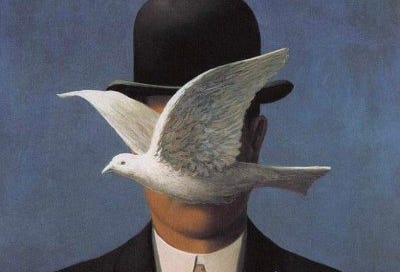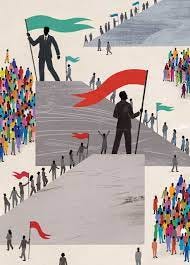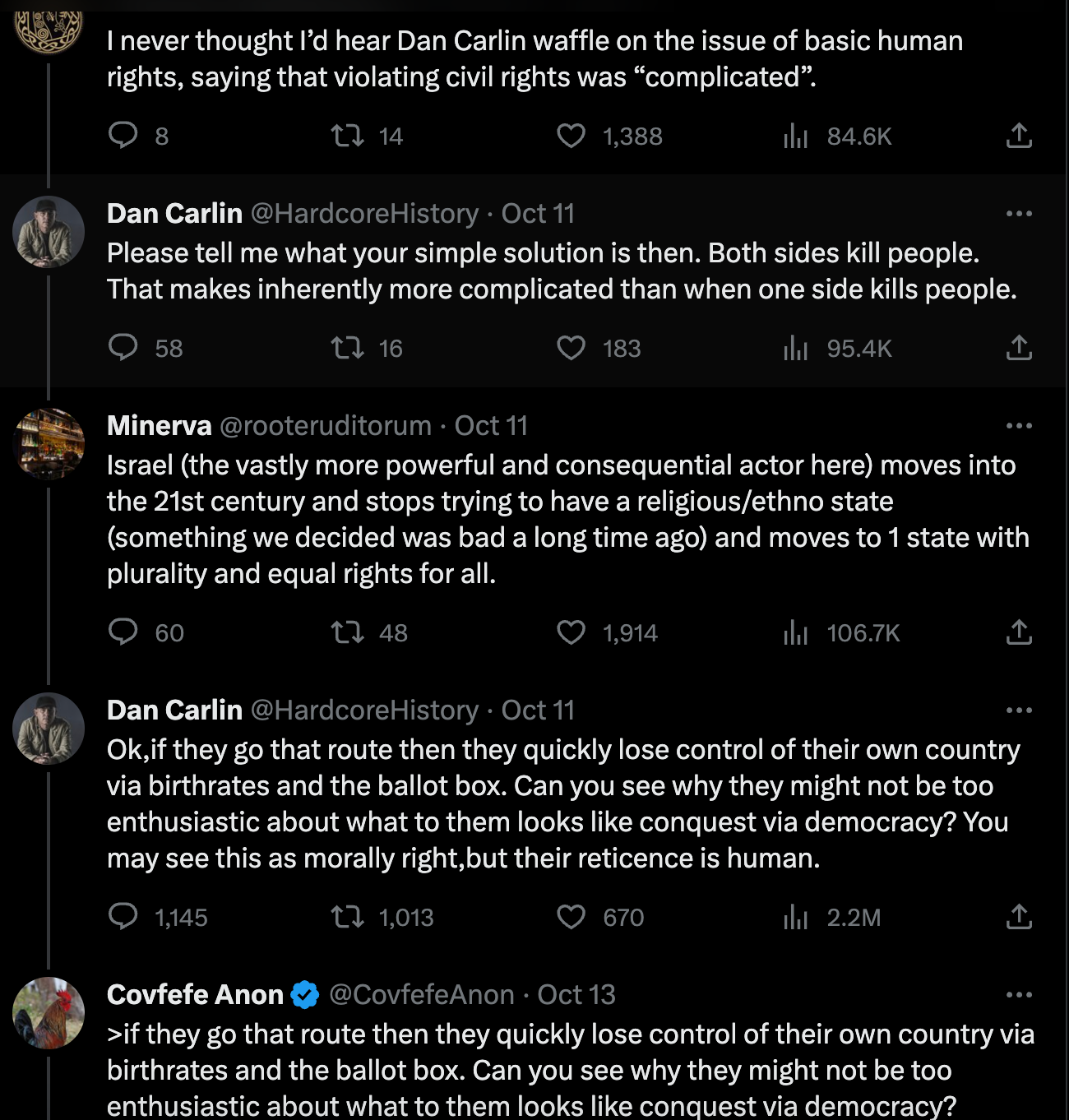Antonio Garcia Martinez and Richard Hanania both wrote great pieces last year about Fukuyama and how critics love to bash him but ultimately misinterpret his claims about The End of History.
Fukuyama’s critics think he’s claiming liberal democracy is the final form and thus implying that every country will be liberal and democratic. At one point, this didn’t seem that far-fetched, as it was certainly U.S. intent to help facilitate that. But after our miserable “nation building” experiments in Afghanistan, Iraq, and the “Arab spring” more generally, it does seem like a pipe dream.
Fukuyama’s defenders believe that when he said liberal democracy was the “final form” he did not imply that every country would be a liberal democracy—on the contrary, he even predicted some backsliding into previous forms like nationalism and communism and monarchy, but he said it would be exactly that: backsliding. There would be no further innovation on a governance level, just stale repeats of the old failed models.
To quote Fukuyama:
The decline of community life suggests that in the future, we risk becoming secure and self-absorbed last men, devoid of thymotic striving for higher goals in our pursuit of private comforts. But the opposite danger exists as well, namely, that we will return to being first men engaged in bloody and pointless prestige battles, only this time with modern weapons. Indeed, the two problems are related to one another, for the absence of regular and constructive outlets for megalothymia may simply lead to its later resurgence in an extreme and pathological form.
In his other book, Identity, he still posits that liberal democracy is “the final form of human government”. But now he recognizes the possibility of liberal democracies “decaying or going backwards” and reiterates a claim made in his earlier work: that liberal democracies have not solved the problem of thymos. Thymos is the part of the soul that “craves recognition of dignity”. As a result, people will “struggle for the sake of struggle.”
Experience suggests that if men cannot struggle on behalf of a just cause because that just cause was victorious in an earlier generation, then they will struggle against the just cause. They will struggle for the sake of struggle. They will struggle, in other words, out of a certain boredom: for they cannot imagine living in a world without struggle. And if the greater part of the world in which they live is characterized by peaceful and prosperous liberal democracy, then they will struggle against that peace and prosperity, and against democracy.
Fukuyama's end of history is a derivation of Alexander Kojeve's, but there's a big difference. Kojeve's end of history is essentially communism, whereas Fukuyama's is of course capitalist liberal democracy.
Kojeve in the 1930s was an actual Stalinist, so Kojeve's end of history is quite literally the end of struggle, the end of disagreement. What's left, he says, is all the things that make people happy, and none of the things that cause stress or strife. In other words, a form of secularized Christian heaven. Or, depending on your perspective, hell.
Something that’s interesting is that the post-WWII American right is not even in the same ball park as the historical right. The dispersion of allowed and practiced politics really compressed sharply on both the left and the right after WWII and especially after 1989. Buckley emasculated the Right from what it had been for centuries before. Our cultural history of the Right stops at World War II and "Nazis!" But there was a lot more before that.
Why does this matter? Well, it’s instructive for what happens after the "end of history". In other words, what happens next.
Indeed, there are varieties of both leftism and rightism that were more common pre-WWII that seem to be coming back. We are surrounded by people who are vocally advocating for socialism and wokeness, but not for people who are vocally advocating for the right wing counterparts, despite people claiming that they exist.
But the more the far left comes back, the more we're going to get the far right back. And Trump isn't remotely close to what there is to bring back.
You can think of it using Nietzsche’s concepts of Master Morality and Victim Morality. The far left is Victim Morality pushed all the way to its logical conclusion — elevating the weak and those who claim to speak for them. The far right pushed to its logical conclusion is the opposite. Neither seems like a very good idea. But the more Fukuyama’s “last men” try to force the culture to venerate weakness over strength in all cases, the more you should expect the opposite response.
Capital H History
In Fukuyama parlance, an event is part of Capital H History when it’s a fundamental advancement in political philosophy and the ideas of the optimal ordering of society.
A capital H Historical event would the point at which all of the puzzles of how to optimally ordering society would be solved, and after that there was no more History, no more productive seeking of better ways to order society. And the result would be essentially paradise, or as close as we can come to it on earth. Or that’s the utopian view, at any rate.
There would still be *lowercase* h history — for example, you could still have the rise and fall of states — but there would be no more forward intellectual or moral progress.
That is the difference between Capital H History and lowercase h history — the former moves thinking forward, the latter is merely a stale rehashing.
Nietzsche was probably the leading exemplar of the dystopian view—that reaching the end of capital-H History mean the end of vital humanity, therefore the rise of the Last Man aka the bugman.
Marx also embedded these ideas in his philosophy; his famous line on what people would do after socialism was adopted — fish in the morning and sing in the afternoon or whatever — was very Kojevian. We still have strains of some of that thinking today "With UBI, we'll all become jazz musicians".
So the thing with Hegel (early 1800's Germany), Kojeve (1930s Europe), and Fukuyama (1980s America) was that they each more or less concluded that the state of civilizational progress at the time they wrote was likely close to the top, close to the end of History.
Fukuyama of course wrote at the apex moment of the ascent of liberal capitalist democracy as communism went down in flames. That point of history (~1989) resolved the grand conflict of the 20th century of fascism vs communism vs liberal democracy.
Since then we’ve naturally assumed that liberal democracy is the best possible system that could ever be invented. Lowercase h history won’t stop — there will still be lots of political infighting and rise and fall of states and shit flying and stuff happening, it's just that none of it will matter intellectually. None of it can possibly lead to any actual civilizational progress.
So when we look at what’s been going on in Ukraine/Russia or China, it’s possible that we can call them retreads. It’s unclear if there are any new intellectual ideas at play in China, or any lessons to be learned that will lead to advances beyond liberal capitalist democracy. Some people see a new model of state capitalism; others see more of the same stuff that was tried in the 20th century and never worked very well.
So for anything to be Capital H history now it has to be something that could lead to orderings of society that will someday be viewed as superseding liberal democracy circa 1989.
Which brings the question of Israel and Palestine. Is this Capital H History, or lower case h history?
The bear case is that these endless cycles of ethnic grievance advance nothing. Not a single thing will be learned regarding a system that could be better than liberal democracy. No new systems of anything will come into being. No questions will be answered. There's no new dialectical question anywhere in sight. It's just Groundhog Day.
The bull case is that perhaps we will finally reconcile the question as to whether it’s legitimate for a nation to prioritize its own people over another people. This is how most societies pre-WWII operated, and hasn’t operated since. Israel is the only modern western nation that gives its own people special rights over others.
“A people” is the historical norm. Everyone prior to 100 years ago knew the concept. It’s conjoined ethnicity, religion, culture, society, and land. Then liberalism comes along and says, oh no, you can’t have that. It's why Israel is forever a pariah state
This exchange gets at the tension:
In a conversation with Antonio Garcia Martinez, he once joked that the great historical irony is that the last vestige of real Western Greek-style democracy is a bunch of Jews stubbornly clinging to a desert they believe is promised to them. You serve in the phalanx, you go to temple, and you go to the border region to subjugate barbarians. That's so foreign to the Western mind at this point.
So what question is this conflict bringing up? The Western question about pluralistic liberalism vs religious nationalism. Not necessarily via Israel vs Palestine itself, but in how the conflict and Israel will be perceived by the West. Is their current order legitimate? or is it Apartheid? Maybe it will be reconciled. Maybe it will be disputed endlessly with no clear answer. Regardless, history continues.
Thanks to Marc, Antonio, and Richard for conversations that inspired this piece





I remember hearing Fukuyama’s “end of history” theory relayed to me by a third party and thinking he meant all countries would be liberal democracies. That seemed obviously wrong to me. I also remember seeing criticisms of it which all interpreted his theory the same as I had.
But then I heard the idea straight from his mouth on a podcast. And he explained it exactly as you explain it, and it makes perfect sense. I can’t find a reason to disagree, and it’s an easy theory to understand.
Weird how some people are just universally misunderstood by their critics. It’s as if the critics have some vested interest in not understanding that which they criticize.
Concepts that originated on one continent can't translate onto other continents. Europeans can be liberal democrats, but most of the third world can't. Even other high IQ societies like East Asians its not clear they could without our stewardship and a bunch of unprincipled exceptions (not much immigration in East Asia).
There is just so much difference between first and third world populations. Liberal democracy can't figure out a way to bridge that gap, because its designed for a more egalitarian society at a higher cognitive standard.